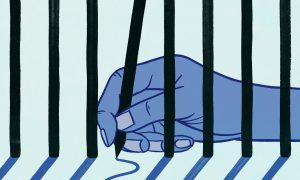The affects of Digital Poetry on an disillusioned English Major
As an English Major and a lover of literature, my experiences with poetry have always been conventional and reduced to the page. While I have encountered and studied spoken word and musical poetry, I never gave much thought to digital literature until now. For the past four years of my university experience I have been creatively constipated. This was until I encountered Young-Hae Chang Heavy Industries, and my love of poetry was recovered.
The first poem I ever read on that page was Rain on the Sea, and what first attracted me to it was the music that was used. Fast paced jazz, reminiscent of the fifties Beat era is played, and I am inspired to move with it.
When reading poetry on a page, one has to really focus. There is silence, stillness, and it takes some effort to move through the poem uninterrupted. Because Young-Hae Chang poetry moves so quickly, I am forced to read every word for fear that one will miss anything. It is composed of text based animation that lasts a few minutes for each piece. Opening the first few poems, I was bombarded with the full blown weight of the written word, how I imagine poetry should be were it not confined to the restrains of the page. By using music, particularly jazz, a unique pace for every poem is set. I have often found when reading poetry or writing my own, something is missing. The music and limited reading time in Young-Hae Chang behave as guide lines, translating the shape of the poem through timing. The text flashes on the screen in time with the music and a tempo is set so that when reading along I read at a certain pace. This affects the way the poem is interpreted and felt, and these ‘special effects’ not only drew me in, but they planted me in my place so that I had no choice but to let the poem wash over me.
Before experiencing Young-Hae Chang I was disillusioned with poetry. There is, at times, a flatness to the written word, and poems in particular often don’t suit being stagnant. Digital poetry allows words to truly move and reflect the abstract thoughts they may be describing. It lends an energy that is vital in poetry, and behaves as a living thing, jumping about the screen restlessly.
This form of Web Art shows the dynamic nature of poetry as a form of literature focussed on rhythm, expression of feeling, and freedom.
Digital literature has rejuvenated my love of poetry, presenting it in a fresh, modern way that seems alive. It inspires, intrigues and provides a platform for people to explore human thought and emotions in a way we never could before. If you showed digital literature to Keats or Yeats, they would think it nothing short of magic, and in a way it is. The way Young-Hae Chang present their poems is how I always felt poetry should be presented, and Digital Literature, in this sense, has inspired me to write less self consciously, and more freely, now that I am aware of the different forms writing can take.



